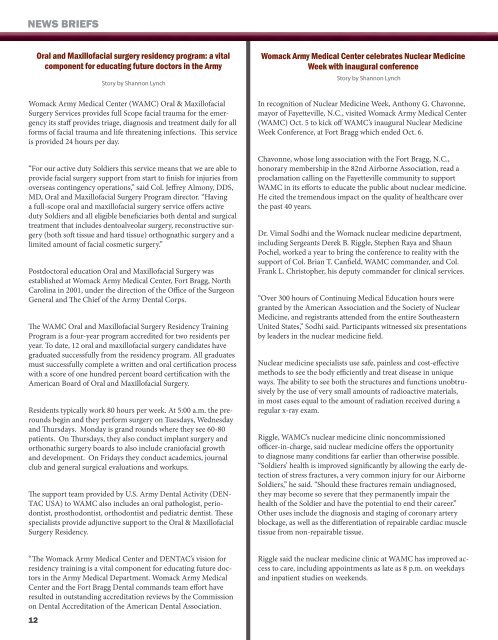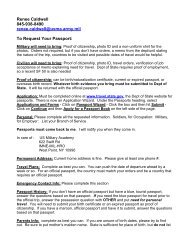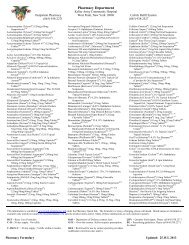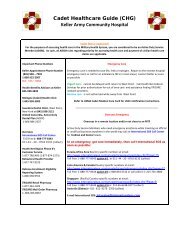North - Keller Army Community Hospital - U.S. Army
North - Keller Army Community Hospital - U.S. Army
North - Keller Army Community Hospital - U.S. Army
You also want an ePaper? Increase the reach of your titles
YUMPU automatically turns print PDFs into web optimized ePapers that Google loves.
NEWS BRIEFSOral and Maxillofacial surgery residency program: a vitalcomponent for educating future doctors in the <strong>Army</strong>Story by Shannon LynchWomack <strong>Army</strong> Medical Center (WAMC) Oral & MaxillofacialSurgery Services provides full Scope facial trauma for the emergencyits staff provides triage, diagnosis and treatment daily for allforms of facial trauma and life threatening infections. This serviceis provided 24 hours per day.“For our active duty Soldiers this service means that we are able toprovide facial surgery support from start to finish for injuries fromoverseas contingency operations,” said Col. Jeffrey Almony, DDS,MD, Oral and Maxillofacial Surgery Program director. “Havinga full-scope oral and maxillofacial surgery service offers activeduty Soldiers and all eligible beneficiaries both dental and surgicaltreatment that includes dentoalveolar surgery, reconstructive surgery(both soft tissue and hard tissue) orthognathic surgery and alimited amount of facial cosmetic surgery.”Postdoctoral education Oral and Maxillofacial Surgery wasestablished at Womack <strong>Army</strong> Medical Center, Fort Bragg, <strong>North</strong>Carolina in 2001, under the direction of the Office of the SurgeonGeneral and The Chief of the <strong>Army</strong> Dental Corps.The WAMC Oral and Maxillofacial Surgery Residency TrainingProgram is a four-year program accredited for two residents peryear. To date, 12 oral and maxillofacial surgery candidates havegraduated successfully from the residency program. All graduatesmust successfully complete a written and oral certification processwith a score of one hundred percent board certification with theAmerican Board of Oral and Maxillofacial Surgery.Residents typically work 80 hours per week. At 5:00 a.m. the preroundsbegin and they perform surgery on Tuesdays, Wednesdayand Thursdays. Monday is grand rounds where they see 60-80patients. On Thursdays, they also conduct implant surgery andorthonathic surgery boards to also include craniofacial growthand development. On Fridays they conduct academics, journalclub and general surgical evaluations and workups.The support team provided by U.S. <strong>Army</strong> Dental Activity (DEN-TAC USA) to WAMC also includes an oral pathologist, periodontist,prosthodontist, orthodontist and pediatric dentist. Thesespecialists provide adjunctive support to the Oral & MaxillofacialSurgery Residency.Womack <strong>Army</strong> Medical Center celebrates Nuclear MedicineWeek with inaugural conferenceStory by Shannon LynchIn recognition of Nuclear Medicine Week, Anthony G. Chavonne,mayor of Fayetteville, N.C., visited Womack <strong>Army</strong> Medical Center(WAMC) Oct. 5 to kick off WAMC’s inaugural Nuclear MedicineWeek Conference, at Fort Bragg which ended Oct. 6.Chavonne, whose long association with the Fort Bragg, N.C.,honorary membership in the 82nd Airborne Association, read aproclamation calling on the Fayetteville community to supportWAMC in its efforts to educate the public about nuclear medicine.He cited the tremendous impact on the quality of healthcare overthe past 40 years.Dr. Vimal Sodhi and the Womack nuclear medicine department,including Sergeants Derek B. Riggle, Stephen Raya and ShaunPochel, worked a year to bring the conference to reality with thesupport of Col. Brian T. Canfield, WAMC commander, and Col.Frank L. Christopher, his deputy commander for clinical services.“Over 300 hours of Continuing Medical Education hours weregranted by the American Association and the Society of NuclearMedicine, and registrants attended from the entire SoutheasternUnited States,” Sodhi said. Participants witnessed six presentationsby leaders in the nuclear medicine field.Nuclear medicine specialists use safe, painless and cost-effectivemethods to see the body efficiently and treat disease in uniqueways. The ability to see both the structures and functions unobtrusivelyby the use of very small amounts of radioactive materials,in most cases equal to the amount of radiation received during aregular x-ray exam.Riggle, WAMC’s nuclear medicine clinic noncommissionedofficer-in-charge, said nuclear medicine offers the opportunityto diagnose many conditions far earlier than otherwise possible.“Soldiers’ health is improved significantly by allowing the early detectionof stress fractures, a very common injury for our AirborneSoldiers,” he said. “Should these fractures remain undiagnosed,they may become so severe that they permanently impair thehealth of the Soldier and have the potential to end their career.”Other uses include the diagnosis and staging of coronary arteryblockage, as well as the differentiation of repairable cardiac muscletissue from non-repairable tissue.“The Womack <strong>Army</strong> Medical Center and DENTAC’s vision forresidency training is a vital component for educating future doctorsin the <strong>Army</strong> Medical Department. Womack <strong>Army</strong> MedicalCenter and the Fort Bragg Dental commands team effort haveresulted in outstanding accreditation reviews by the Commissionon Dental Accreditation of the American Dental Association.12Riggle said the nuclear medicine clinic at WAMC has improved accessto care, including appointments as late as 8 p.m. on weekdaysand inpatient studies on weekends.





